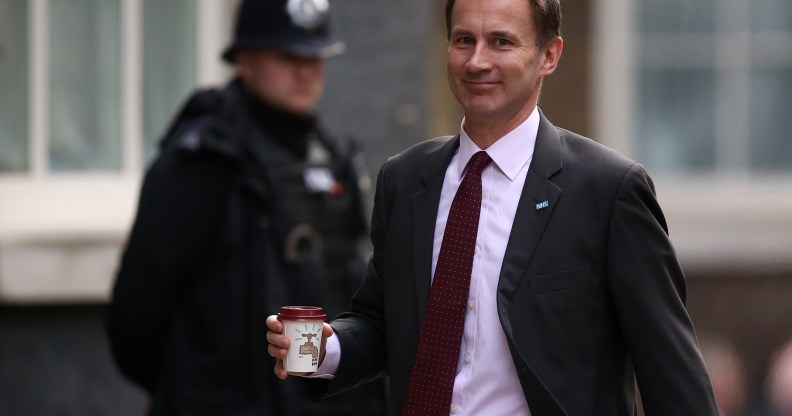Charities unite to oppose ‘disastrous’ government cuts to HIV budgets

The UK’s leading HIV charities have banded together to warn about ‘disastrous’ cuts to HIV prevention and support budgets across the country.
As a result of cuts to local government spending, a number of local councils have cut or scaled back their HIV services.
In some of the most extreme cases, as in Oxfordshire, the local council has cut the entirety of the £50,000 HIV Prevention and Support budget, meaning the service relied on by hundreds of people will close.
Services have also been drastically cut in Bexley and Bromley, Portsmouth, Slough, and Bracknell – amounting to over £200,000 in lost funding for services between the councils.
Although the councils claim that alternatives to the local services are available on the NHS, a coalition of HIV charities have warned that the scaling-back will leave many HIV-positive people without vital support.
A letter to Health Secretary Jeremy Hunt, signed by nearly 30 different HIV charities and organisations from across the UK warns: “These funding cuts are short-sighted and ill-thought through as they will ultimately lead to extra pressures on health and social care as people with HIV fall into acute need and crisis, as well as significant costs to the NHS from an increase in onward HIV transmission.”
The letter is signed by the Terrence Higgins Trust, National AIDS Trust, METRO Charity, the British Association for Sexual Health and HIV, the BHA, the British HIV Association, the Brigstowe Project, The Food Chain, the George House Trust, GMFA, Herts AID, Leicestershire AIDS Support Services, Live HIV neutral, the LGBT Foundation, the NAM AIDS Map, NAZ, the National HIV Nurses Association, Positive Action, Positive East, Positively UK, River House Resource Centre, Sahir House, Summit House Support, Spectra, The Sussex Beacon, Thames Valley Positive Support, Waverley Care and Yorkshire MESMAC.
Alex Sparrowhawk of Terrence Higgins Trust said: “As a person living with HIV, I can prove to Jeremy Hunt that HIV support services are vital to dealing with your diagnosis and managing this health condition.
“The national campaign is about sounding the alarm to policy makers, councils, and the public – these essential services are under serious threat and we need your help.
“At a time when rates of HIV are increasing, stigma is as apparent as ever, we are seeing the start of a disturbing trend of local authorities across the country scrapping HIV services.

Yusef Azad of the National Aids Trust said: “HIV remains a stigmatised and misunderstood condition. It’s not the same as other health issues where people can rely of support and sympathy from friends and colleagues.
“HIV support services can be the only place where people are open about their status, the only places they can find advice and support, the only place they can talk to other people with HIV.
“They are an essential component of the long-term care of people with HIV. To remove them would leave a lot of vulnerable people stranded.”
 .
.
Dr Greg Ussher of METRO Charity said: “People living with HIV can be some of the most vulnerable members of our communities.
“Proposed cuts of up to 100 per cent to HIV support services will decimate vital provision for people that cannot speak out against their local authority’s plans for fear of the stigma publicly disclosing their HIV status might bring.”
The letter in full:
We are writing to you as a group of HIV and sexual health organisations and people with HIV to share our increasing concern at the trend by local authorities across England to decommission HIV support services.
Coping with an HIV diagnosis and living with HIV long-term can be stressful and challenging, with personal relationships, long-term health, employment and finances all being significantly affected.
HIV support services are an integral part of helping people deal with changes brought on by a condition that still carries with it much stigma and affects some of the most vulnerable and excluded people in our society.
They also prevent further HIV transmission by supporting people with HIV in safer sex and adherence to medication.
With over 103,000 people in the UK living with HIV in 2014, HIV support services are needed more than ever. Evidence suggests more than a third of people with diagnosed HIV need to access these vital services in any 12-month period.
They are widely agreed to be an essential element in the HIV care pathway, supporting long-term condition management, by (for example) NHS, England and BHIVA.
2015, however, saw a worrying trend of local authorities across the country defunding totally HIV support services. In Oxfordshire, Bromley, Norfolk, Portsmouth, Slough, Bracknell Forest and Bexley, the local councils are set to scrap this essential provision.
We understand more councils may follow – either defunding completely or cutting funding to the point where meaningful provision is impossible.
Many of the organisations affected by these cuts also provide HIV prevention for individuals at the highest risk of HIV – vital interventions that will ultimately prevent new HIV infections and save the NHS much needed cash in HIV treatment costs.
The estimated cost of lifetime HIV treatment is up to £360,000 per person. The future of such preventive work is also put in jeopardy by this disinvestment.
These funding cuts are short-sighted and ill-thought through as they will ultimately lead to extra cost pressures on health and social care as people with HIV fall into acute need and crisis, as well as significant costs to the NHS from an increase in onward HIV transmission.
Whilst of course these cuts are being made by local authorities, we strongly believe you can and should influence these decisions. The Health and Social Care Act 2012 left HIV support services without a clear commissioning home, and therefore especially vulnerable to defunding.
As a result, we risk the loss of community-based services which have been a mainstay of our HIV response since the early days of the epidemic and of which we should be very proud.
A clear statement from the Government on the importance of these services and action to bring stakeholders together and agree a sustainable basis for their commissioning and provision are urgently needed.
We are asking for a meeting as soon as possible with you to discuss how we can together provide a health and social care system that works for the needs of people living with HIV.

